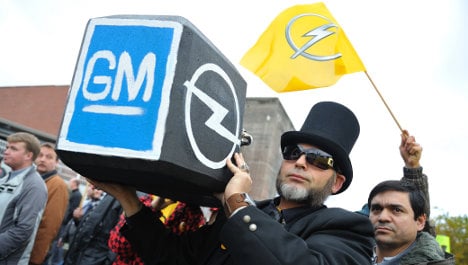Around 10,000 Opel employees gathered in Rüsselsheim near Frankfurt with banners and a fake coffin to express their rage at General Motors, which torpedoed the planned sale of its European operations to Canadian auto parts manufacturer Magna earlier this week.
“We want to show that we workers won’t simply take this and accept it,” said Alfred Klingel, the head of the workers’ council at the Rüsselsheim plant.
But Uwe Raubert, who has worked at Opel for 33 years, said he is not expecting to have a job much longer.
“I’m going to laugh myself sick if GM restructures us. It’s not going to work, it’s all going to go down the drain,” he said. “Everything is up in the air. There is huge scepticism among workers about GM’s plans.”
Thousands of his colleagues took part in other protests at Opel plants in Bochum, Eisenach and Kaiserslautern
The US carmaker’s shock announcement late on Tuesday stunned Germany and came just hours after Merkel gave a historic speech before a joint session of the US Congress. Accordingly, the German media has been scathing in its commentary on the turn of events.
“Opel – the big piss-take,” screamed the front-page headline of the mass-selling Bild newspaper on Thursday. “The Americans duped everyone.”
“It is truly tragic,” wrote the Berlin daily Der Tagesspiegel, calling the decision a “stinging slap in the face” for the chancellor.
“On the same day Merkel enjoyed her great triumph she also experienced her worst embarrassment. It’s a disaster for German-US relations.”
Merkel’s government had invested major financial and political capital in saving Opel from insolvency before a September general election which she handily won. About half the company’s employees work in Germany.
Beyond pledging €4.5 billion ($6.6 billion) in German state aid for the ailing company, Berlin spent months shepherding a rescue deal.
Economy Minister Rainer Brüderle fumed that GM’s U-turn was “totally unacceptable” while North Rhine-Westphalia state premier Jürgen Rüttgers said the move showed “the ugly face of turbo-capitalism.”
But General Motors, which was struggling with a bankruptcy reorganisation backed by the US and Canadian governments, said it was abandoning the agreed plan to sell Opel to Canadian auto parts manufacturer Magna and state-owned Russian bank Sberbank, and would restructure the unit itself.
GM also warned employees and unions that it could still allow Opel to flounder if the workforce upholds its threat to refuse wage concessions – a move blasted as “blackmail” Thursday by the daily Süddeutsche Zeitung.
The company also estimated it would need €3 billion in state aid, and was confident it could secure the sum from the German government and other European countries where Opel and the British Vauxhall division have plants.
US President Barack Obama’s spokesman insisted his government had nothing to do with the about-face.
“Business decisions by GM are made by the corporate leadership at GM and not by anybody at the White House,” spokesman Robert Gibbs told reporters.
But the Süddeutsche newspaper was sceptical.
“Perhaps (US President Barack) Obama genuinely wasn’t in the picture when he received Merkel in the White House (on Tuesday), although this doesn’t say much for him,” it said.
“Perhaps he did know something, and that would put him in an even worse light. In any case, with their inconstancy the GM managers have caused serious damage to German-US relations.”
GM vice president John Smith acknowledged that “the German government had a very strong appetite for the Magna proposal, so I can well imagine and well understand” the German reaction. “I am hopeful they will find merit in our plan.”
Smith contended that there had been very little difference between the offers put forward by Magna and a rival bidder, the Belgian investment firm RHJI, and what GM has in mind for Opel.
But he added: “We continue to believe that we can restructure Opel with less money than any other investor.”




 Please whitelist us to continue reading.
Please whitelist us to continue reading.
Member comments